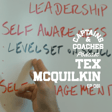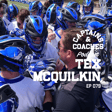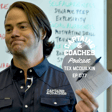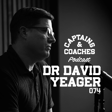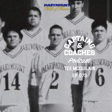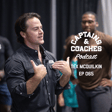Introduction and Guest Introduction
00:00:00
Speaker
Welcome to the Captains and Coaches Podcast. My name is Tex McCulkin. I am your host and I get the opportunity to sit down with Coach CJ Appenzeller at the Super Coach Summit. CJ and I were both presenters at this event and it was an amazing opportunity. I got to learn more about ATS, Appenzeller Training Systems, three facilities that he owns and operates in South Jersey, best gyms in South Jersey. We also explore how CJ takes the approach of introducing and solving performance and return to play problems. He does an amazing job painting this picture on his Instagram
00:00:38
Speaker
A must follow this conversation. We dive into the anatomy and physiology of return to play, how to navigate that conversation with both athletes and parents, allowing them to understand that full athletes journey. This conversation is
Return to Play: Anatomy and Physiology
00:00:58
Speaker
also anchored in a lot of leadership.
00:01:01
Speaker
As CJ was a Division 3 All-Star, as well as Shenandoah University, we spoke to his first year, freshman year captain, all the way to lessons that he's applying with the team that he's leading at his three facilities in South Jersey.
00:01:17
Speaker
A quick shameless plug, this episode is brought to you by Old Bull, the program. Delivered through Train Heroic, I'm having a great time writing this one for you. This is a flexible, efficient, effective, strength and conditioning program where you choose your own adventure and I also sprinkle in self-leadership lessons so you begin to expand your abilities, not just physically, but also mentally, emotionally,
00:01:45
Speaker
and then apply all the lessons that you're learning into your life. Go ahead and give it a seven-day trial. Link's in the show notes. But without further ado, let's hand it off to CJ. Ready, ready.
00:02:18
Speaker
Text Max. Let's let's ride. Action.
Training Facilities and Coaching Approach
00:02:23
Speaker
Welcome to Captains and Coaches Podcast. We are live on the scene. like We're we're wrapping up the Super Coach Summit in Western Virginia. Great time, great hospitality and speakers, which includes this guest with me. Got some awesome trading cards. Hell yeah, dude. This is sweet. You look really handsome in this. I know. I don't know where they got the picture. CGI, AI, whatever's going on now. But I'm with CJ Appenzeller, ATS training systems up in Jersey. Dirty Jers. Yeah, man. Going on. Open up third. Yeah, so we have ah one ATS, and then we will have three total, two eight APTs. We call them active personal training.
00:03:08
Speaker
Yeah, so they're ah under a different name on different umbrella a little bit different target market So our ATS people are athletes actually our business started out as completely athletes Transition to having adults hosting adults as well. Then our active personal training branches are adult only 40 plus year olds There you go. Yep. So an evolution of the business as you get into it, but you got into it for specifically working for athletes athletes. Yeah. And initially it was all baseball guys and it's become baseball and fighters and
00:03:43
Speaker
return to play, essentially is kind of like the markets we still service myself as a coach, the only people I'm currently coaching because of my roles in leadership and in the business or stuff is true professional athletes or return to play athletes. Those are the guys and gals that I'm working with. Yeah, special case high school level kids that They tried everything and now you get the opportunity to bring them back. Correct. Which is changing lives. It's fun, yep. So, man, take us back to your athletic journey. I know we're both D3 All-Stars. D3 All-Stars, JUCO Bandit, both. JUCO Bandit is a new term for me. Yep, and a D3 All-Star. Not really an All-Star, just a D3 guy. Well, that's a joke.
00:04:28
Speaker
yeah We're all all all stars. so Yep. So ah played outfield in college and was really, really in love with the game of baseball. Had a lot of fun. I was a grinder on the field. That's kind of what I did. And ah I think baseball, if anything, taught me that. It taught me work ethic. and It taught me how to show up and and try to be the hardest worker in the room or on the field, whatever the case may be. I actually got
Academic Roles and Teaching Philosophy
00:04:52
Speaker
the offer to play at the school. I played at Shenandoah University in Virginia.
00:04:56
Speaker
Hornets, right? Yep, yep, yep. And I actually got that offer because I literally went to a camp and during BP, which baseball people know, like, kind of just dog BP as a fielder. You kind of just shag. During BP, I was flying around laying out. I would run has fun yeah i would dude id run from field layout for a ball, like left center, catch, dive.
00:05:20
Speaker
to get up, drop the ball, run the ah opposite direction layout again. Coach is like, what the what is wrong with this guy? um But we love the hustle. We would love to have you here. So it's how I wound up there, which is pretty cool. That is awesome. What'd you study there? Exercise physiology. I think there it was called kinesiology. Oh, interesting. Yep, yep.
00:05:38
Speaker
Yeah, I was a ah health science guy. There you go. Yeah, I think it's all the same. you know You're not wrong. And now i I'm a teacher. I'm a professor adjunct at ah another D3 school, Rowan University. And what's funny about that is we change the name of that program every single year.
00:05:54
Speaker
And you're still teaching the same basics, essentially? I teach ah exercise physiology. I teach exercise prescription. And then we have a great lab class called Lab Personal Training, where I just teach guys and
Training Culture and Performance Metrics
00:06:05
Speaker
gals how to coach, essentially. Dude, that that's amazing. So I was ah adjunct at my alma mater, Marymount, and it was the foundations of personal training. yep And like we had a book associated with everything.
00:06:20
Speaker
And then it was like, all right, this is basically we're going to get you to pass the test. yep But then we're actually going to get hands on. Love that. So then took them around my contacts in DC. We visited different gyms that were personal training focused, group fitness focused. Very cool. And then exposed them to the different opportunities that fitness presents. Yeah. And then hit up ah performance weight rooms at Georgetown. So dude, that's a cooler class than I have. I can't even um maybe I maybe can't even isn't the right verbiage, but I haven't.
00:06:49
Speaker
Right? No limitations, but I haven't taken our students off campus and I'd love to. seeing because i literally I literally have two gyms within 40-minute drive. With different styles. With different styles, servicing different people. Yeah, so it's definitely something we we need to at least look into um because that's the biggest missing link, right? Coaches don't coach and then they're kind of called on to have a bachelor's degree and like, hey, go ahead, run these athletes through or run this mom through, whoever they're servicing.
00:07:19
Speaker
Yeah, and that it's assumed, and that that's where we're going to spend a lot of time living in the podcast is that those assumptions, whether it's coaching, whether it's leadership, because you are you're hired for this job based off your credentials, it's assumed You can lead it's assumed that you can coach yep similar vein a high school kid or a college kids is given the title captain based off of Fundamentals hustle, whatever it may be. Yep hustle. It's assumed Yep that they now can change the behavior of their teammates and get them to act the same way that led them to that opportunity Yeah, it's it's a big gap. It is a big gap. Yeah, and that's
00:08:00
Speaker
why we're targeting it here. yeah so I love i love personally love baseball, grew up a fan. like And so I ah but played football, and okay but appreciated baseball just through through my father. So with football, there's a direct correlation connection to weightlifting. If you do this, you will get bigger because you need to go through that person. yep With baseball,
00:08:26
Speaker
I don't feel that there's a training culture within the sport. And here you are running a facility focused on training for and preparing for the sport. yep So where where did you find that connection for yourself personally that then led you to become a very passionate leader in that field, that industry, and put out some awesome content?
00:08:48
Speaker
happy hour on Instagram. Yeah, thank you. um Yeah, so I think number one, to to address the kind of the first point is like, it's murky, because x plus y does not always equal z. However, with that being said, like the right performance metrics will have a significantly higher carry over onto the field. There's a conversation that's been going around this weekend between us kind of hanging out this idea of dynamic correspondence,
00:09:13
Speaker
which is a very real subcomponent of the training culture and environment. Number one, and number two, from a psychological perspective, and as we're on captains and coaches, there's a significant buy-in factor when something looks a little bit like what they do on the field. So that's number one. It is a murky culture, but it's starting to develop now.
00:09:36
Speaker
However, with that being said, you'll never have to convince a linebacker to wear pads out to practice. He wants to go hit, right? Much the same way, you're never going to have to convince a pitcher to go throw as hard as he can. They love that.
00:09:51
Speaker
You'll never have to convince a hitter to go swing. Take BP. They love to hit. What you will have to do is have some level of influence to get them into the weight room because of this murky culture.
Parental Conversations: Prevention and Rehabilitation
00:10:03
Speaker
So not only do you have to find some things that create buy-in like we just kind of alluded to with things that, you know, carry a higher level of dynamic correspondence,
00:10:11
Speaker
But also, you have to be able to educate and then demonstrate some level of metrics to keep them coming back day in and day out. So, you know, we time sprint times. We time or we we do velocities for rotational medball work, right? All these things, now we're metric-driven, number one. Number two, wow, this stuff's kind of looking like what we do on the field. And then number three, now we can actually track that progress instead of saying, hey, looks better, right?
00:10:37
Speaker
And to to go full circle on your question, I got into the weight room because I wasn't that good at baseball. Right. So, you know, I think a lot of D3 guys probably experienced this where you're like, I can keep coming in here every single day and working really hard. I hope it works, but it's not. I kind of like it anyway. Right. Right. And I can't go out to the field every single day and night. Once practice is over, it's kind of shut down. It's dark out. You got to go do something. So I would either be in the cafeteria or I'd be training. Right. Yeah.
00:11:07
Speaker
Yeah, the training culture, at least 20 years ago, when I was in college for lacrosse, it also didn't exist. Yep. But then the only way I could find myself on the field was through the weight room. But then I would, there was dudes that would just rip 100 mile an hour shots. And this is where I started to ask questions and really get into performance. Yep. Is that guy can't bench 185 pounds. He died, literally got rabdo.
00:11:35
Speaker
Because from bench press, yeah because just getting crushed by the weight had to deadlift it off him. And then he he rips 100 miles an hour shots. It just didn't ever made sense to me. yeah And I'm just repping 315. No big deal. And I can't break 80? Question.
00:11:52
Speaker
Yeah, and that's where like, really having an idea of not only what metrics am I trying to drive, right? But also, what are the pieces of this puzzle that may formulate a bigger picture, right? So for us, it's about movement capacity, resiliency, and then performance, meaning like, if I don't have access to ranges that I need to access for elite level shooting velocity or throwing velocity, or, ah you know,
00:12:20
Speaker
actual barrel speed swinging a bet, well, I need to get that access first. Once I have that access, now maybe I can play with driving up some performance metrics that would be beneficial or provide some level of carryover. But before I have that capacity, I need to be able to do that. And then at the other side of this whole equation is this idea of resiliency and robustness. So if an athlete was like, hey, I already do X, I already throw 100 miles an hour, why should I train with you, right? What do what do I hope to derive from that? Well, I hope to keep you on the field throwing 100.
00:12:51
Speaker
If you're already at the very top tier of your sport or very top tier of the performance metric that you look to drive forward, it's all about being able to repeat that over and over again, while staying healthy and on the field, right? We talked about the best ability is availability. We can't do that without building up some level of movement capacity, some level of robustness, and hopefully some level of performance driven metric. Yeah, I like
Emotional Intelligence in Coaching
00:13:12
Speaker
that term robustness. And I mean, resilience, well defined, but then robustness, that's an opportunity to connect. Yep, the awesome that the dude, girl, boy, whoever is is connected with. yeah And then where you're saying there, I can't help but remember a Kenny Powers quote. He was talking about lifting weights. yep Coach tried to tell me to go lift weights. I'm like, why should I pick that up? I already throw the ball faster than anything. And that's where that's that level of connection right there. It's heavy. yeah Exactly. Exactly. I want you to be able to continue to do that. I don't want you to do it one time. I don't want you to be off the field.
00:13:50
Speaker
and That's what we talk about. That's what we conversate. And you have the opportunity to connect with parents yeah before catastrophe strikes. Hopefully, yeah. So speak to us about the different conversations. the Prevention conversation which can be had with coaches as well. Yep versus the Rehabilitation conversation. Yeah, so Nobody likes to have the prevention conversation. It's not sexy. It's not marketable It's not very salesy if you went to a sales training, I doubt that's what they would have you speak about um so what you have to do to hold on at least in my mind to hold on to your integrity and and also really keep ah you know an athlete first model, which is something I was literally just discussing, is you have to mention it. But I don't know if it's the focal point of your conversation with the parent. I think it's mentioned. And then the focal point of the conversation from a buy-in perspective with the parent journey.
00:14:46
Speaker
is like, hey, I want this person, this athlete to reach their absolute fullest potential, which has an embodiment of robustness and ah and resiliency built in. But I think the sexier thing, the thing that they really wanna hear about is like, is he gonna throw harder or is he gonna run faster? What's his 60 time gonna do? And then I have to have the other side of that conversation quite a bit with athletes who have never worked with me before, never worked with my business before, who come to us from a physical therapist or from a chiropractor referral Hey, this kid is quote unquote cleared.
00:15:18
Speaker
but there's ah there's a bridge to cross here before they can go back out onto the field, throw as hard as they want or sprint as fast as they want. And that's really, again, that's where I kind of come in now. That's a different conversation and a conversation parents are now ready to have because unfortunately, as you put it, catastrophe has already struck. Now now I get to have this educational conversation that I wish I could have had with you six, nine, 12 months ago, depending on what the severity of injury, but unfortunately nobody wants to hear until it's too late.
00:15:47
Speaker
So in in line with that, speak to us about the, the mental performance, like the trust in your own body side and both the, are you preparing them to be resilient if they're healthy? And then is there any different conversation you're having when they're on that injured side, the return?
00:16:05
Speaker
Yes. So there actually is. And like the conversations you have with every single athlete are unique, right? Because ah ah one of the best things I ever heard, it was probably 12 years ago from another coach was like, Hey, some athletes need a kick in the ass and some athletes need a pat on the head.
00:16:22
Speaker
And I'm like, man, I love that conversation, right? Because there are some athletes you have to connect with. And depending on the level of coach you are and kind of where you are in your business and your and your professional life, you might only work with one type of athlete, like you might really select like, hey, I'm really only gonna work with the guys who need a kick in the ass. I'm only gonna work with, you know, and we know some coaches like that, both of us do texts that like, I pick this athlete, I pick this archetype of athlete to work with, which is great. But for me, I work with a pretty diverse group of athletes where some athletes really truly need a pat on the head, right? They need me to instill confidence in them each and every day on both sides from a performance driven model and a return to play model.
Building Athlete Relationships
00:17:02
Speaker
And then on the flip side of that, I also deal with athletes who need a kick in the ass, you know, and you'd, I think as a casual kind of viewer or someone who doesn't work with elite athletes yet, or maybe once or two later or whatever the case may be, you would be shocked.
00:17:16
Speaker
to find out how many of the highest performers, people you watch on TV compete, need a pat on the head. Oh yeah, need love. And that's you know that's when we get into this whole discussion around the athlete journey and the athlete-coach relationship, which is really what we're trying to do. you know i I spoke this weekend here, and my number one goal when I work with an athlete, I fancy myself really smart. I fancy myself a really good coach. I fancy myself someone who knows the Xs and Os intimately. But my number one goal is to have an impact. yeah And I can't have an impact without opportunity, and I can't have opportunity without a relationship with the athlete.
00:17:52
Speaker
So that's my number one goal. So yeah I think the question was like, how do you discuss how do you talk to them? And it's really impossible for me to sum it up because it's such a unique conversation and journey with each and every person that walks through the door.
00:18:04
Speaker
Yeah, the and in line with that they relate. I aim to almost develop a process for teaching a lot of emotional quotient, the EQ and number one is relate. Yes, you as a coach have a hard time relating with say I want to work with college football or I want to work with rowing, swimming, whatever. That sport, because you love the sport. yeah But then you're in these different weight room environments. D1, pro, D3, high school, it doesn't matter. And you're challenged to have relationships with those athletes, you may not want to be there. Because the rest of the stuff down the line after that first step is extremely difficult. Holding them responsible, having tough conversations. If you don't have a relationship or you have a trouble relating to them, it's going to be a long road.
00:18:53
Speaker
Absolutely, yeah. I don't think you can have those conversations without the backbone first. I mean, you can have the conversations. But do they land? Yeah, those planes aren't going to land. Those planes are missing in action, Bermuda Triangle style. yeah um I 100% agree with you. And I think, for me, sometimes it's hard, especially 13 years into the industry, when you have a high school kid who you're having some time. Because as good as I am in all those things, we still struggle at times, right? That's the reality of being human.
Self-Awareness in Athletes and Coaches
00:19:22
Speaker
still struggle to relate with the kid. And when you when you do do that, you almost want to skip steps. You almost want to pull rank you know and say, do you know what I've helped? Do you know what I've done? It's like none of that lands if you try it, number one. Number two, but that's like those are the mental gymnastics you do on a day to day basis where you're like, all right, let me take a step back.
00:19:41
Speaker
Find the common ground here. Let me see what is actually going through this athlete's mind right now in terms of what he thinks he needs, where he is currently in his journey or his development as an individual, as a human, maybe aside from the athlete side. and see what See where I can kind of bridge this gap.
00:20:00
Speaker
So yeah, i a I'm aiming to, again, create a a methodology within EQ. Yeah. So relating on the the coach's part, that's a high self-awareness. Yeah. Because I'm going to try different things in a social awareness, because I'm seeing if stuff lands or not, and I can read that. Yep. So then in in parallel with the the relationship, it's also a self-awareness on part of the athlete. So if they have low self-awareness. Yep.
00:20:27
Speaker
A lot of the the adjustments, the coaching, is not going to get applied. If I'm asking for ah certain adjustments within their foot position, say on a change of direction or a squat, and they come back,
00:20:39
Speaker
to me as coach saying, I wasn't doing that. Or I was. Yeah. Or my favorite is the Ampey Turner. And i've I've had kids lose their they're ah they're cool about this if they only turn on the right foot. Yeah. So they change direction on 5-10-5 with the right foot. Then they come across the 10 yard right foot again. So I have to say like, hey, you're going to face me. Everybody's facing me on this rep. Yep. So then we get both turns. And then just call a kid out.
00:21:07
Speaker
Say, hey, Ryan, I need you to face me the whole time. yeah I was. I wouldn't be saying if it weren't true. yeah So just that low awareness, now I know I got to lean into him more yep then ah than the rest of the kids that are in tune at that moment in time. So that self-awareness, in line with that, what's a way that you test the kids could be viewed as coordination, yeah right? Coachability, all these different things. How do you test their self-awareness so then you gauge of what coaching you pressure you need to apply? Yeah, that's a great question. So I think it's, it's multi-factorial. Number one, I think everything, and this is going to be, I think we talked about this earlier. This is going to be a reflection piece for me, right? So if Ryan in that exact same situation says, Hey, I was, you know,
00:21:59
Speaker
For me, where am I dropping the ball in terms of this coaching relationship currently? It's acute, it's silly, it's all those things, but it's happening, right? Because I either coached it or I allowed it to occur, which means I wasn't very clear on my details and or my coaching ability, or now A, or B, I probably now have an understanding, as you said, like, man, this kid needs a little bit more.
00:22:26
Speaker
What I currently already am providing is not enough. So number one, I like to reflect back on like kind of myself first. Before I ever go outward, I want to go inward. That's something actually I learned from talking
00:22:37
Speaker
weirdly enough. So, uh, you get crazy enough. So, uh, I was walking through New York city with Mark Fisher, who's a prominent name, probably not maybe for your listeners, but in the fitness industry from a business perspective. And I was talking and, uh, Mark looked at me and he was kind of like nodding as if he were agreeing. You were teasing Mark.
00:22:57
Speaker
No, I was talking about third party. Okay, which again, this this was um a defining moment in the way I approach coaching and my life, which is crazy, because Mark and I, this was the first time we ever met. And he's kind of like agreeing with me, you know, he's kind of nodding his head, or at least I'm thinking he's agreeing with me. I'm like, yeah, he's loving this Right. So I'm gonna keep talking, talking a little talk a little And he looks at me and he goes, you know, I used to think that too.
00:23:22
Speaker
In my head, I went, cash register, I'm the man. Mark Fisher, this prominent figure agrees with me about this other person. You know, we team hate, right? and And then he goes, he looks at me, he goes, then I remembered, like, everything that I see as a fault in another person is probably me being reflective of something I'm missing in my own self. And I want it to jump in front of traffic in New York City.
00:23:51
Speaker
I was embarrassed in that moment. And I also made a cognitive effort from then on moving forward when I was coaching. And when I'm talking to try to identify, like, where is the thing that I see in this person that I'm talking about, I'm pointing out to them, that's probably missing in me. yeah It's probably a reflection, right? As humans, we only see in others what we also possess within ourselves, whether or not we're showing that at that time, that's left to be determined, right? yeah But that that's a thing. So I think that was a long-ass answer for number one.
00:24:27
Speaker
And then number two, like how do I test that emotional stability, that emotional, it just takes time, right? I don't know that I have, and maybe I should, but I don't know that I have like a standardized procedure for how I test the actual ah level of coachability of an athlete other than time in the trenches. Spend time, spend time.
00:24:48
Speaker
which is one of the reasons it's so hard for me as a business owner now to jump back in and coach at the level that I want to when I do coach because I don't coach so much.
Leadership in Coaching
00:24:57
Speaker
It's like, man, that time on the floor, you know, but ah time in the trenches. But from a connection, communication standpoint, it's so important. There's nothing that can you know overshadow that. And that's one of the biggest hurdles of remote coaching.
00:25:12
Speaker
Like, I don't really have time with you. yeah You know, we can message, we can scale it, we can do things with it. You know, you probably do it better than most, and I probably do it pretty good and in the grand scheme of people just sending out workouts. yeah But you're still missing a big piece. ye and so Yeah, that's that's what I aim to do with my programs. Understanding where most people will fail on a lift.
00:25:37
Speaker
And then priming that pump with specific warm up targeted at the limitations yep as as I understand movement. And then within the programs also have a script for them to lead. So coaches viewing them as ah you get a self lead yourself. So this week it's grit week. We're focusing on grit. Yes. So you can use these scripts personally for yourself just to hold yourself accountable and keep the mirror up. Yep.
00:26:04
Speaker
or an opportunity for you to then lead your team with yeah this message. Yeah. We talked about that yesterday. and i I love that. Yeah. I love it. I love a theme. I love you being proactive in the delivery of that. I mean, no one else is doing that. And it's one of the most valuable lessons outside of like performance and resiliency and robustness that we actually do deliver in the weight room yeah as a strength and conditioning professional. Those are the life lessons that we are get the opportunity to deliver day in and day out.
00:26:34
Speaker
which is the real impact. ah and so And so connecting that with the opportunity to relate in low self-awareness, if coaches are allowing their their day to affect the pre-practice, pre-workout huddle and they're i just get the guys going and they miss that message, that's that's a valuable time. They have dropped the ball. 100%. Because the one common thing that we all have as coaches and teams is like the pre-weight room huddle, pre-practice huddle, and the warmup. Yep.
Managing Expectations in Private Sector Coaching
00:27:08
Speaker
That's it. Everything else can change. The strength, the the game plan, the scheme, the game. Yeah. All of it can change. Yep. But we always can control what we say to to begin, and then their warmup. Yep. So taking full advantage of that.
00:27:22
Speaker
and then aiming to steer their performance. Well, that's what we talk all all the time about, especially in a game like baseball, control the controllables. You can barrel up 10 baseballs as a hitter and get zero hits. So if you're only focused on the result in a gameplay scenario, you are setting yourself up for disappointment and failure. But if you focus on the things that you can control that are within your actual grasp,
00:27:47
Speaker
then you're going to set yourself up to be significantly more positive and significantly more successful from a psychosomatic standpoint than and than anything else. And that's exactly what you're saying. is like As a coach, grab the guys. You have this moment. You're not sure everything else is going to get responsive and reactive from this point on, but this is the one proactive moment you have. yeah Why not utilize that?
00:28:12
Speaker
They don't understand the value, the low awareness of their responsibility and themselves. And it's low hanging fruit. How hard is this? How low tax is script? It's fun. yeah ah So a couple of things. I want to move to the theme of now parents, because parents are paying your bills. Yes, they are. So they have a lot of opinions, and I'm i'm sure you have your a high amount of stories that you're bringing into it. And so how are you aiming to now shape the behavior of the parents that are paying your bills and the clients. yep Control the controllables. How many you come in with expectations that aren't in line necessarily with what we you value or know to be true within sport?
00:28:55
Speaker
Yeah, almost all of them, almost every parent to answer that question. But so I think if you're in the private sector, you're managing two journeys. And that's super important to understand from an athlete perspective, you're managing the journey of the athlete, you know, and when I say the the journey, I mean how they think, feel and react with your business or service.
00:29:14
Speaker
And then you're also managing that exact same journey and journey for the parent. But those journeys are completely separate. So every athlete you sign up, you essentially brought on two clients, we don't call anybody clients, but two clients words, it just sounds so transactional to me. um So you have to manage both. That's number one, just an awareness that you have to do both will help so many coaches in the private sector go to another level from a business perspective, and from an impact perspective.
00:29:41
Speaker
Number two, being super clear with expectations and objectives is so important. Of course, there's a sales process that we have to account for. We're not gonna have a ah parent walking off the street and say, hey, can you get my son to Vanderbilt? And immediately say, no, at least not most of the time, right? There's kind of a ah a way in which that you can deliver a message that doesn't offend the individual, right?
00:30:09
Speaker
And for me, because I'm further along in the process, I can be a little more blunt than maybe a coach just starting out. And I could say something to the effect of like, hey, anything is possible. But just so you know what you're asking for, you're asking for the number one school in the country. And you're asking for your son at 13, where we can't really predict or project where his skill development threshold is just yet.
00:30:39
Speaker
So what you're asking is nearly impossible for me to promise, and within the levels of my integrity, I cannot. That sounds significantly better than, your kid sucks, no, right? Or that'll never happen. Yeah, sure, sign here. Yeah, exactly. or that's the word That's the alternative that probably many salespeople take is like, absolutely, we can.
00:31:00
Speaker
money back guarantee, like right? so But ah yeah, so I think the understanding to, hey, we have to do both journeys. We have to manage both of these, number one. And number two, being clear on expectations. so One of the biggest changes for me as a leader, which to me, leadership is a lot like coaching, right? There's many factors that directly relate and or mimic one another, right? So when I'm leading my team, the biggest change for me has just been being very clear on expectations and very blunt about the process by which these expectations have to be reached. So I do the same exact thing in a console with a parent like, hey, like this is what you can expect from me and my business and our service. This is what
00:31:42
Speaker
we would love to have your son do or your daughter do in order to reach these goals that you've set that we've worked together to set and and kind of made clear. So I think those are the two big ones. Understand you have to manage two journeys. Number one, number two, make sure you're clear and you set those expectations. I like that. in In line with that, how does the conversation change between parent only, athlete only, and parent athlete?
00:32:08
Speaker
sit in the office with you. Yeah, you know what's interesting about that is I think you have to be able to literally flip that switch instantaneously. So when we sit down for a consult, we have both the parent and the athlete. It's the only time that the parent is allowed and in our facility, right? so we tell And we tell them, and again, clear expectations. I don't want to get three months in and then you want to pop in for a workout.
00:32:29
Speaker
Hey mom, hey dad, listen, I would love for you to watch today, watch us go through the assessment, but also, if you get a little bored with this stuff, please sneak off and kind of watch our athletes train. This will be the only opportunity you'll have to do that because we don't allow parents on our coaching floor moving forward. Super important that myself and my staff get to bond with your son, your daughter, and also kind of guide them through this process and be one of their biggest advocates. But if you're here, that does murky the water around who and what they're supposed to be listening to and looking at for coaching.
00:32:59
Speaker
So please take this in today, and then moving forward, you're not going to be able to. right So we're clear about that expectation. But then I think in that initial console, you have to be able to switch back and forth, back and forth. And a lot of like the phrasing that I use is I'll say, especially because what will happen is you'll ask the kid the goal, and then the parent will jump in and give you the goal.
00:33:15
Speaker
right Again, just very clear, very blunt, but not ignorant, and and not in in any way, you know, derogatory. Just, hey, dad, thank you so much, Tex. Thank you so much. I appreciate that. And i'm I'm tracking with exactly what you're saying. I'd really love to hear your goal, Tex Jr., about what it is that you'd like to accomplish, because it might be exactly that, but it might also be a little different than dad's. And let me tell you that that's totally okay, because I can't really understand or help you effectively until we communicate.
00:33:47
Speaker
yeah That's it. So I think you flip-flop kind of back and forth right and any parent that gets I think ah insulted by that Probably not a fit for your business. Anyway, I hate to say that because everybody can learn and grow I told you the embarrassing story about Mark Fisher and myself and I think I've grown a lot from from that time Which is eight or nine years ago, but yeah Yeah that bit There was often a time I wanted to like force a lesson on that parent. yep Now it's it's more so aimed to ask the questions why. yeah And then connect with that or ask them about their athletic background and try to understand the the push and the drive for them yep to, ah you know for lack of a better term, force that their goal onto their child. Yeah. and And that's important background information, but also for me,
00:34:42
Speaker
you As you go through 10, 12 years of this, you kind of have a feel immediately. right It's almost a question that doesn't need asked. If you're telling me you want your son to play at Vanderbilt and you want me to get him there, I know you didn't play Division I baseball.
00:34:57
Speaker
I don't have to ask. yeah And I almost feel like people get offended when I do. So for me, a lot of times, you know it's the framing of those questions in an effective manner. And also like using some leading questions too. you know Hey, what about this outside of sport? Would you like Tex Jr. to derive? know What do you want him to get? Of course, of course you want him to throw harder, run faster, slashes 60 time. you know Of course, duh. That's why we're here, right? But what outside of this, if there was anything could you and or that we could deliver, would you want him to get? And I think that's a pretty good question. That'll point you in the direction of like, hey, is there something outside of sport?
00:35:42
Speaker
that this parent really would love to see kind of get carried into their son or daughter's life. Yeah. The questions I always aim to bring it back to education is a bias that I loved the opportunity of school and grad school that sport provided me. I couldn't get into Marymount unless I played lacrosse. Yup, stud.
00:36:02
Speaker
Not just not an interested high school student. So then aim to make a connection to education. What's what's your favorite subject in school? Yeah science biology Well, I don't know anything about Vanderbilt, but I would imagine to then find a biology school. Yeah or ah Agriculture, right? So I live in a big FFA area. Okay in Texas a now. Yeah. So there you go. So now All right. Well Cool. Yeah. Yeah. the There's an opportunity there. So I love that.
Understanding True Leadership
00:36:33
Speaker
You're quite a wordsmith, Tex. I will say. Well, it's, I'm 5'7 genetic trashcan. So I got to walk my way through these conversations. Bench 315. Multiple times in a row. I mean, because my arms are so short. But then I also use self-deprecating humor with the parents. Yep. Oh yeah, you got to have that. As a D3 all-star. Yep. Because, I mean, they didn't play college ball, but they're now
00:36:59
Speaker
uh, putting their shame on me as a division three athlete. yeah I tell them I had, I wouldn't trade any of it for the world. Yeah. And then I paint the picture of what a division one athlete life day in the life looks like. Yeah. And then yeah, having now coach strength at division one universities can explain the life cycle there. So maybe I didn't make it. Yep. But you've been through it, but I've led.
00:37:24
Speaker
athletes through that journey yeah and onto success. And then da the dudes that I've coached through Georgetown, many started in the dawn of the PLL. l yep So then reference that and can make that connection back to, and then. Yep. Athletes that I was able to relate and have a good relationship with to now help craft and arm wrestle these parents into. And this is, as a Houston fan, I love to drop this one, uh, cause the owner of the Houston Rockets, his name's Fertitta. Okay. Big business restaurant guy in Houston. All right. And so I tell them the story, uh, cause I grew up, went to elementary school with his daughter.
00:38:02
Speaker
So then in passing knew the family, but then he's got a business book. And so this man owns freaking NBA team. Yeah. He knows what he's doing. Yeah. He's not doing too bad. The title of his book. It's called shut up and listen. So then I speak to them about for Tita and his success in this book. Yeah. And then that's me implying and just laying it on there pretty thick here. Shut up and listen. Yeah. Yep. Yep. Fun conversations that I liked.
00:38:29
Speaker
Yeah, one of the biggest issues too, when you're when you're talking with an athlete in front of the parent, is getting the thing, getting in the stuff, getting the juice, so to speak, out of the athlete, because they'll just defer, defer, defer, and I've seen it more and more as these generations kind of move through our facility. I think you had a bullet point on that in your slide. And then, but I don't know if you touched to it or you were rushing through because you didn't get enough time. your presentation shut Shout out Super Coach Summit. yeah But yeah, speak to us on that juice. Yeah. What coaches can aim to in a conversation. Yeah. So the concept that I was introducing in that slide.
00:39:06
Speaker
ah to go full circle was like, and this is a concept I introduced to every single class I teach, by the way, I always say bring the juice. But I don't mean because I'm a hype guy, right? I'm, I'm very excitable, right? I speak loud, I'm i'm kind of an extrovert, I'm outgoing all those things. But I don't think that that's always called on or called for in every situation. So I always say like the juice looks a little different. Some days you want cranberry, some days you want orange.
00:39:31
Speaker
You always want the juice, though, right? So I think, ah so for me, it's like the way I show up for a lecture to teach a lecture to college students is pretty different than the way I show up to coach a group of high school athletes. And it's pretty different from the way I'll coach and communicate with a group of pro athletes. um I'm always me. i I never pretend to be something I'm not.
00:39:53
Speaker
but just the versions of me might be slightly different, right? My tempo, my speed, my expectations, because they're all set, but they're just set differently in every level. You know, a high school athlete, and I'm really happy to see them in the gym. If I get them in there three days a week, I'm pumped. If a high school athlete missed a couple of workouts, gets back in, I'm excited.
00:40:14
Speaker
my pro athletes misses two workouts and comes back in I'm gonna let them have it for probably the whole hour of the session every chance I get yeah yeah you know so again and like a student same idea like you know you mentioned you're a disinterested high school kid we have disinterested college students yep so for me it's like I want to meet the student where they are, and I also want to engage the students so they're not so disinterested anymore. Hey, is there a way that I can make this interesting for you? I can't change the the the coursework, right? But is there a way that I can relate this back to something that interests you, that brings you alive, and maybe re-engages you in the coursework and in the class? So I think like the expectations are different, the juice is different, but you always got to bring it. You can never show up flat.
00:41:03
Speaker
No, that's, yeah, that's awesome. I like that. Uh, so I want to lean into assumptions yeah that you had as a leader. So your first time either leading your, your team, yep what assumptions were put on you? What assumptions did you have as an athlete? Yeah. So from an athlete perspective, the biggest assumption was that I could say and do the work and Everyone else would implicitly follow They would copy it which is that's not true, right? That's not that's not how that works It's not a leadership works, but that was the initial of something my initial assumption being a leader So I was a freshman captain of Shenandoah, which was cool. Yep. Whoa. Yeah, so I'm like I have a big deal Yeah, no yeah so it's like ah I'm gonna go ahead and just work my ass off and everyone will do it
00:41:52
Speaker
Then you're in the weight room, 8 p.m., and no one's in there with you. but Wait a second. um What's going on here, right? Because, again, the assumption piece, right? You're assuming. and reno You make an ass out of you and me, right? So that was the biggest assumption. From a business perspective, when I brought on a team of coaches, the biggest assumption I made as a leader is everybody wanted it just as much as me. They wanted growth and they wanted development just as much as me.
00:42:19
Speaker
Then you start to realize, like, you're the one that opened the business. Right. You're the one with skin in the game, which, again, we have strategies and business strategies around, like, getting people invested, right? But initially, that was an assumption that, like, everyone would just fall in line. Everyone was going to want it as much as me. Everyone was going to be there at 4.30 a.m. and leave at 10. Neither of those are true. So then, what was there a moment that led to that or just months of stressing and realizing,
00:42:48
Speaker
Oh, man. There was a gradual gradient shift, which I wish there was a moment, right? There's like, you get what happens is, at least for me, like my experience was that you get one team member from a business perspective, or one team member on your team that shows up with you, like, oh, it's starting to change. But really, you just kind of made a lucky shot. You just got lucky, right? And they enabled your thinking.
00:43:15
Speaker
Just stay a little bit far yeah yeah just to stay where you were. So there's this like slow gradient shift to finally realizing a truth. And that hard truth is that you're going to need a lot more leadership ability and a lot more hard conversations than you've ever really wanted to have to effectively lead. And you're going to need to set clear expectations. And you're going to need to set a very high standard. And then you're going to need to check in with those individuals and hold them accountable to the standard you set. And that's what real leadership looks like, at least in in my mind. And unfortunately, it took years, literally years in my business for me to finally flip that switch. And your reflection stage on that and the gradient slow burn to get there. Pain. What lessons were right there in front of your face as a student athlete?
00:44:01
Speaker
that you're like, oh, man, I learned this, or I should have learned this. Yeah, well, that was the problem. I didn't, right? I was right in front of my face, like, hey, if you don't set that a real expectation that's concrete, right, that's binary, almost, right? Hey, zero or one, right? Like, one, you're here, zero, you're not. It's not you want it to be there when something came got brought up or whatever the case would be. Until you set that true binary standard,
00:44:28
Speaker
You can't expect anyone to do anything because, again, you're you're back to this assumption gradient. That assumption gradient will literally, I mean, it'll burn you bad yeah for a long time. And it did. And it burned it burned my business for a long time, where it was like we would run through interns. We'd run through employees almost. And you know I got lucky. I have an employee that's been with me since the very beginning still.
00:44:51
Speaker
And literally, ah it's almost his fault that I burned so slow, because he's awesome. And sometimes you just get an ace, you know, and you're like, Ah, he'll figure it out. And he does. But the problem is, that's not true leadership. That's not even that's not even good leadership. Right? That's, ah as a matter of fact, I probably slowed his trajectory down, because I wasn't as effective as leaders I could be. Well,
00:45:15
Speaker
Always opportunity and time to change. Always. but That's what coaching is, right? that's Exactly. so And that that's something we're going after. like You experience those lessons as a student athlete. Yep. And so we hear this all over that sports teach lessons. Yeah. Football taught me how to be a man. That's an assumption. We're going after it. that Sports don't teach lessons. Captains and coaches do. Yep. So I love that.
00:45:41
Speaker
Yeah, with now in your, the position as, as coach, as the, the senior leader within your team and just, Hey, this is, this is my perspective on this. So now think back to your young age as an athlete yeah and the lessons that coaches aimed to teach you. So how, how do you now dealing with still hard headed 13, 18 professional year old athletes?
00:46:11
Speaker
ply your perspective so they can they can listen yeah or you hope so yeah I hope so right I hope so I think You know, you just said football taught me how to be a man, right? I think for me... Not me, but... No, I know that's like an ah implicit and assumption of around football, right? I think if I had to put a finger on like one thing that sports in general taught me is that leadership is a requirement and leadership is not passive,
Sports Lessons in Business and Leadership
00:46:40
Speaker
right? And this is kind of what we're discussing and I'm just, we're using other words. We're kind of playing some like word salad here, but um
00:46:48
Speaker
it It won't just occur. right It won't just happen. So there needs to be strategy. There needs to be tactics. There needs to be really, really hard conversations that occur at a micro level and also at a macro level. And like within a team structure now within within the business, for me, we're having micro conversations every day. You saw my team here. my team is you know Some of my team was at the event. We're having conversations about what I expect from them in the room.
00:47:17
Speaker
what I expect from them from a questions perspective, what I expect from them outside of there, right? And it's not to say to micromanage your team, it's to say when they're young, when they're coming on, you have to do a little micromanaging, a little clear communication up front, and then allow for that to self organize later on down the road. So I think when we bring an athlete in, when we onboard an athlete, it's the same thing.
00:47:40
Speaker
We have to be really, really implicit early on about the exact behaviors that we're looking for them to demonstrate and what it really looks like for them to first be led and then to take on a leadership role later. So I get i don't know if I really answered the question, but I do think that leadership won't just happen. It's not a passive pursuit. And it is something that we need to look to instill, number one, but also practice first, number two.
00:48:07
Speaker
Yeah, still using the warmup, every single lacrosse practice that I lead, it's using that warmup to give somebody a voice. yeah So now instead of me calling out the count or the next exercise, just go up. Ryan, four four count pushups on you, ready, ready. And then he hits the count. So the aim there is now freshmen are leading up to seniors, seniors are leading down and everybody's listening to everybody. yeah And it's as simple as a count.
00:48:36
Speaker
So then in in respect to business now, what are some small responsibilities yeah that you start to handle or hand off to your team? Do you have a hierarchy that gradually goes up to then managing their own facility? We do, yeah. That's those are our facility leaders. So from a business perspective, and I don't want to make this into a business chat, right? But from a business perspective,
00:48:59
Speaker
One of the most important things I ever learned is it's impossible to scale complexity. So all of our systems are very, very clear, number one, but also very like elementary in that we have two positions within, well, three, really. We have three positions within our business. We have a director, a director is a facility leader. He runs a program. We have a coach that's someone who coaches and then we have an intern and that's your hierarchy, right?
00:49:23
Speaker
An intern reports directly to a coach, a coach reports directly to a director, director reports directly to me as a CEO of visionary. All I'm hearing is this is a coaching staff. We got our head coach, we got our coordinators, we got our assistants or specialists. Yep, that's it. And if you're lucky, you get an intern. yeah exactly Yeah, exactly right. Exactly right. so um everybody down that chain of command has responsibilities. And I don't know if you call them small in terms of you know how important they are to our business, but I would say there's less responsibilities at each step of that chain. right the An intern's responsibility is to get there, to learn, and then to practice our culture.
00:50:02
Speaker
right A coach it is really there to help the intern be able to effectively demonstrate our culture and then effectively demonstrate our culture within themselves to then pass that on to our athletes. A director is there to lead the coach in such a way and support the coach in such a way that they can do their job and also to grow the program. right that's i mean That's kind of what we do from ah a micro or a macro level. um Micro responsibility.
00:50:27
Speaker
Every team meeting we run, every, this is like a really big piece, by the way, every single team meeting we run, every single person on our team speaks. Sounds silly. You'd be shocked at how many meetings you go to within businesses where only one person talks. And it's essentially a lecture, right? By the way, that's also how I teach. Every single student in my classes talks.
00:50:47
Speaker
every class. and it's great And if they don't, I'm like, what is wrong? Is everything okay? you know but We're trying to drive communication. We're trying to drive some level of ah autonomy within a team structure, right, which I think is super important for from a business growth perspective. I forget what the question was, by the way, but yeah, that's that's how we said it. You're talking business, I'm aiming to connect it to support. Yeah, okay. It's all the theme though, yeah in in leadership, the aim is we want still coaches to make the connections of
00:51:22
Speaker
Hey, you were experiencing this, this struggle, this stripe, this organization, this, this direction, this opportunity to lead yeah your team because it's going to prepare you for exactly XYZ in school or business. Yeah. So the aim is just to shine a light on this stuff, create awareness of what lessons sports are actually teaching yeah and where specifically they're going to prepare you for the real world, not assuming.
00:51:51
Speaker
Yeah, you're playing this it's
Routine and Adaptability in Sports
00:51:53
Speaker
going to happen. Yeah, right in in line with the yet you you were a freshman captain now That prepared you for business period end of story That's the presentation button it up. See ya. Yeah, I need 20 minutes. I need to yeah, or Yeah, I everything up. I was given an opportunity, but I was smart enough to listen to experience. Yeah And I don't know your coaching staff if they were helping you along the way or just, oh, you're, you're the hardest working go hard. Yep. Here's responsibility. Yeah. I think, uh, I think it was a bit of both, you know, where, Hey, we, I think from their perspective is like this kid's working really hard and we want to reward the behavior we want to see.
00:52:39
Speaker
With that being said, I don't know that they were preparing me for leadership as much as they were rewarding effort. Yeah. Well, that, yeah, that's cerebral now. Yeah. yeah Then I didn't know. Yeah. Of course. Yeah. Willing the the team to act like you. man Yeah. Behavior, behavior is a deep dive. We're going to save for our next conversation, shine in light and bring some awareness. One thing for me personally, I want to understand, aim to at least,
00:53:08
Speaker
the yips. Yeah. So, I mean, growing up famously, Chuck Knoblock had it, Yankees, second baseman. And then most recently, Astros, Altuve, he had it for like a whole year. Yeah. Where he just, he was batting DH because he couldn't throw to first base. Yeah. And then I mean, that's a short distance. Yeah, it's not far. It's not far. ah So let's just keep his bat and he can help the team the way he knows how to. Yeah. and not hurt the, like what, what is, where does it start? Where would you aim to lead an athlete oh back to their, their full potential? Yeah, it's, it's such a hard thing to understand because from an outside perspective, do the thing, do what you've always done ah at the Altuve level.
00:54:03
Speaker
And you're here, do what you've always done. um But it's and and it's deeply ingrained from a psychosomatic perspective and there's there's an emotional kind of overlay that starts to develop as it progresses, as this idea, this concept of the yips progresses. So it starts out as a couple of bad throws or errant throws.
00:54:23
Speaker
and it develops into this essentially all-encompassing disorder that is nearly impossible to shake. So if I were to work with an athlete and try to reverse engineer that, that's exactly what I would do. I would start with the lowest level task that looks like or maybe doesn't even look like what we're trying to ultimately accomplish and try to slowly rebuild the self-esteem and the confidence of the athlete.
00:54:50
Speaker
So it might be the simplest of concepts ever on the field. Hey, stand right here and wrist flip this baseball back to the back to first base, whatever it is. right And then so on and so forth. And then we grade that exposure just like any other you know phobia.
00:55:09
Speaker
higher, higher, you know, more aggressive, more intense with ah more on the line as you go. That's what I would do. I've been lucky enough not to work with anyone with the yips severely. I've had some guys that started to get down that path.
00:55:27
Speaker
And we were able to address it with what I just talked about, that graded exposure piece. Like, okay, let's do it in a safe environment with nothing on the line and and like a regressed, a rudiment version of what you're trying to accomplish. yeah And then we'll slowly work out more intense, more on the line, more intense, more on the line, higher velocity. yeah yeah Which is, by the way, like a rehab model too. yeah Everything's connected. yep yep and So in, in line with that, this magic's in the editing. I forgot where it was going to go. I was just too in tune listening. Um, I mean, that's exactly what we do with, with training and with freaking rehab, man, yeah reverse engineering. That's what we were just talking about. He's like, how can you in a rehab setting, right? How can you address the highest level and neurological component or as early as possible? Right.
00:56:19
Speaker
So you know if a guy or a girl has an injured shoulder, right well, what can they do from a high-speed neural perspective on day one? that And that's, by the way, where the current rehab model misses, is that they don't introduce anything high-speed because they feel as if load comes before velocity, when in reality, those are two separate gradient scales.
00:56:42
Speaker
they arere not They have an inner play, but they're not interconnected ah kind of you know on the same level, on the same scale. What's some potential damage that can be done by not understanding concept? well I think, number one, you're slowing down the progression of the athlete. right You're taking them out of the thing they love so much.
00:57:04
Speaker
And what we're talking about is life lessons through sport. You're taking them out of the opportunity to learn those lessons, to learn what it means to lead, to learn what it means to be put into a position to lead, to learn what it means to work hard, to earn something, to not be given something, right? So that's the biggest thing for me, number one, but also number two.
00:57:23
Speaker
from a confidence standpoint, right? You're taking an athlete who only knows how to do X, Y, or Z, and maybe that's the only area of their life that they really excel in, right? This is where they're the big And you're pulling that away from them. And then you're slowing their return to that. I mean, that's catastrophic on several levels. So I think that those are kind of the big things that I wish the rehab industry explained, like understood that or explored that more.
Impact of Training and Rehab on Athlete Confidence
00:57:52
Speaker
And that's what like you know us in the know or whatever, that's what we do. Well, and that's why you get the opportunity to work with the highest yeah of levels, and they trust you over anybody. Yep. that they They definitely, and I love what was said today, is like they believe me first, but then they trust me once you've made impact. And that's that's the highest compliment an athlete can give you or a parent can give you is their trust. right That's something I tell all of our parents. got One of the things I always say,
00:58:21
Speaker
to our parents. When they say anything, a kid commits, a kid hits a PR, runs a grade 60 time, whatever. Thank you so much for everything you've done. I say two things. All I do is hold a clipboard. That's literally the first thing I always say is, hey, I hold a clipboard where i write I draw the map, they followed it.
00:58:41
Speaker
That's the first thing I say. And the second thing I say is thank you so much for your trust, because the options are endless, including to your earlier point, not training at all, not doing strength and conditioning or strength and power or strength and speed or speed and agility training. That's also an option. There's elite elite athletes in every sport that don't drink. Yeah, you have outsiders.
00:59:05
Speaker
How do they do that? That's that's a question about you know what you believe in. Yeah, they they have to work not to be there. Incorrect. That's how gifted they are. Yeah. Yeah. Which is real. And gifts, that's what I mean to say all that, depending on what your belief system is, like who bestows those gifts? I'm not sure. I'm not sure. you know Which this this is the question I wanted to get to that I forgot, and also but luck.
00:59:30
Speaker
Do you believe in luck? No, luck's not real. So I mean, superstition is everywhere. Yeah, baseball's huge. Especially baseball. Yep. So is is it the same process of talking a guy away from yips to talking them away from luck? Or is that just a battle you're you don't worry about? I i'd never concern myself with the concept of luck. If an athlete concerns themselves with the concept of luck, I'll introduce the concept of routine.
00:59:57
Speaker
Oh, in place of luck, right? So everybody in baseball, you know, you have the crazy kind of outsiders with their routines and rituals and stuff. No more Garcia Parris. No more. Yeah, exactly. with it Yep. Yep. Yeah. He sticks out to me with the with the batting gloves. so um It's okay to have a ritual. It's okay to have a routine. I challenge athletes consistently that when they're playing games that are quote unquote less important or with opportunities are quote unquote less important to get outside of their rituals and routines, challenge yourself to not do that. Just see, just check it out. You know, why not? yeah if If the, you know, if the stakes are less, just try because what I want you to do. And as a, as an athlete later on in my career,
01:00:42
Speaker
um in college, actually, I got so caught up in superstition and routine, I never want any athlete to be there, right? So, yeah, so my ah junior year of college, I remember specifically, every time I went to hit in the fall, I used a different bat. Just grab a bat off the rack. Anybody random. It doesn't matter. Size didn't matter. I was like, let's rise. One at bat, I'd swing a 34, next to bat, I'd swing a 32. I'm like, I'll just figure it out, you know? It's fine, i'm but i'm ah I'm adaptable, I'm an athlete.
01:01:10
Speaker
you know And that was a belief that actually served me really, really well and you know down the stretch there. but and serves me well now in business too, you know ah you know? Even coaches have it, right? I don't have my coaching shoes on. I forgot my polo. i'm Dude, I'm ready to coach whenever. i just never heard that I just told an Olympic athlete just now as we walked through that hallway. I said, I was skipping a talk, don't tell anybody, and he he was hanging out in the hallway and he said, are you okay? I said, yeah, I just need a breather. My brain gets kind of overloaded and I need to take some breaks because otherwise I won't digest anything.
01:01:42
Speaker
I said, the only thing I'm always ready to do is coach. He's like, yeah, you ready to coach? I was like, yeah, you want to go to the track? I'm ready to roll right now. I don't care. so Only because I have a belief in myself, I have a kind of a core concept of adaptability. And I developed that through sport by pushing myself outside of rituals and
Coaching Fight Sports
01:02:00
Speaker
routines. So it's okay to have a routine. That's okay, especially if that routine serves you. But I think when that routine becomes an anchor to your growth, that's when you need to start to challenge it and break it down.
01:02:12
Speaker
Yeah. So if you notice those patterns and behaviors within the high schoolers, I jump on them. Jump on them? Absolutely. Yeah. Like if an athlete's like, wow, I would have done better if I had my back. No, you wouldn't have. Just straight up. No, you wouldn't have. Yeah. No, you wouldn't have. Probably not. Uh-huh. Yeah. Or if it's really tough, if it's a tough thing to overcome, I might say like, I'm really sorry you feel that way.
01:02:42
Speaker
But I'd like to challenge your belief around that. Yeah. Yeah. Finding weight. I mean, any behavior that you foresee is disruptive long-term down the line, yep it's got to be called out and aimed to be shaped. Yep. And the sooner, the better. Yeah. The deeper it gets, the harder it is to shake. Well, yeah. It's a lot of, I call it palms-up behavior in lacrosse. Like, you got a bad call against you, or yeah something happened.
01:03:12
Speaker
yeah palms are up to the ref, yeah that body language from a hundred yards away, it's undeniable. Yeah. So aiming to teach a lot of body language and me is sport and strength and conditioning coach. If you are resting on your knees, your body language is telling me you're tired and you need more conditioning. Yep. Thanks. yeah Yeah. Fight sports are the best for body language. Oh, negotiat man. We didn't even begin to get into your fight coaching experience. Yeah.
01:03:42
Speaker
Yeah. Well, but we'll touch on that briefly. Okay. What are some body language behaviors, things that you're looking for in that individual athlete sport? Yeah. ah Individual athlete sports are significantly better at this, right? Because you can't, hide there's nowhere to go. There's nowhere to hide. All right. You're in the ring. You're in the ring. You could tell.
01:03:59
Speaker
um eye contact and eye control are two of the big ones for me. right Where is the athlete looking? Where is their focus? right And then in between, when there is moments for breaks, whether it's between rounds or even in moments of disengagement, and I'm going to double jab out here and create some space.
01:04:16
Speaker
Where does the athlete glance? The athlete is not focused on the opponent. And a specific part of the opponent, based on the strategy, that'll change a little bit slightly. And in you know people that are interested in fights and stuff like that, it's a different conversation. right like Depending on the size of the opponent, based on the style of the opponent, we might be focused on a different part of their body when you're fighting. So when you're not looking them eye to eye most of the time. um But again, like if your eyes are all over the place, right? Yeah, you may be concussed because I know somebody's listening to the same oh that person's got a concussion. Maybe, maybe, maybe they just got punched in the head. They might, right? But also they may be fatigued and physically or mentally or emotionally. We're all three, you know, and it's a, it's a conversation at least it's a thought process at least. And if you're the coach in the corner, you need to understand where that athlete is.
01:05:07
Speaker
One of the hardest things to do as a fight coach is to throw in the towel, right? Because the truth of the matter is if you pull an athlete out of a fight, you're fired. And that's kind of the truth 98% of the time. You throw in that towel for an athlete, you're you're probably going to get fired.
01:05:24
Speaker
right? So it's up to you. You want to talk about like coaching hierarchies and concepts of selflessness. You're giving up your, you know, your relationship at some level with the athlete to save the athlete from themselves by throwing in that towel, which is For me, very poetic, but I'm also a poetic guy. like yeah so you know and I have this emotional connection to coaching in that way too. i like you know if If I were to write my my coaching credo, I would want to write it in blood. you know like I'm passionate about it to that level. so I do like the fight sports because of those things. like
01:06:05
Speaker
an emotional connection to coaching and fighting is normal. yeah Whereas in team sport, it's not that it's not normal, but it would be it would be less normalized. Less normalized. Yeah, different different energy, different vibe. and For sure. i There's a greater margin for error in team sport. For sure. We have multiple games this season. And you have support. Versus, yeah, yeah the big match, the big opportunity, the one. yep Yeah, we we fight on ESPN. We're in Vegas. ah four or five weeks ago, we don't know when our next fight is. It's the truth of the matter, you know? So we have to live, the whole team and the fighter have to live with the outcome that came. Yeah. And then you get the opportunity to help him develop and continue to guide and grow, just being there for him and having the relationship and now continue to guide his growth.
01:06:59
Speaker
Yeah, that's that's what we do for coaching. And that's what why we coach. Yeah, that's ultimately you coach because you want to move people. Right? That's what I was discussing impact, right? For me, it's like, it's two things. It's the mortality of your coaching role, right? Knowing that your role will eventually end and that's okay. Number one, and then number two,
01:07:24
Speaker
understanding that the ultimate goal is to leave a coaching legacy in each individual athlete you work with. That's something that you taught them and it's hopefully it's not sprint technique. right like Hopefully that's not what you left, but something that you left them you want to live on.
01:07:41
Speaker
And yeah, that's my poetic kind of stance on coaching. That's what I want to do. I know every relationship will end because I'm not going to be here forever. ah The athlete is not going to be here forever. ah ah You know, we might have a falling out for other purposes other than death, you know, but every relationship will end.
Legacy and Lasting Impact
01:08:02
Speaker
However, you have the opportunity every day.
01:08:04
Speaker
to potentially create a legacy and or a mark, a dent. I always talk to my staff about like create a dent, right? Create a dent within that athlete's mindset framework that lives on beyond your relationship. Mic drop. Yeah, it's pretty much how I get down.
01:08:26
Speaker
Yeah, let's let's wrap it there. I know. This is what happens when you get more than 20 minutes to have a conversation. Weird. Have. Yeah. Reeve, call it CJ Awesome. I appreciate you. ben I met you a year ago at the same event. I'm yeah i'm grateful for that. And the- Dude, I'm grateful as hell for you, man. The connection ah over all these months and then moments like this, we get to come hang out. Yeah, dude. I will say this for your listeners.
01:08:51
Speaker
I learned something from you in every conversation we have, which is powerful stuff, because as I said, I skip a lot of talk. um But to just have like a passing conversation, even over beers last night, and to learn something. And like for me at this point, you too, like we're pretty far along this journey.
01:09:09
Speaker
Like sometimes like a phrase is like what you put in the notebook. Sticky. Yeah. I got plenty of. Yeah. Here and I wrote, ah man, what do I got? Yips. I got, that was my note. Control the controllables. Yeah. I'll just leave with that one because that's all I can read on this scribble.
01:09:26
Speaker
A circled co-contraction for some reason. oh Yeah. We were talking co-contraction for me on camera. um but They don't count it actually. Yeah. Co-contraction
Closing Thoughts and Gratitude
01:09:35
Speaker
is an interesting concept that we use in rehab to put it simply in an athlete perspective. It's like hey getting all the musculature around a given joint to contract in a in such a way that they support one another.
01:09:49
Speaker
I'll say that. but I'm down to do another episode. Oh, yeah. We'll get ceiling in on this. And, uh, dude, yeah, if if you, if him and I go together, we can make fun of each other too. That's, well, that's what we do here. All right. CJ, where should they go? yeah Definitely follow you. This yeah must follow. Yeah. So I'm at happy hour everywhere. That's important. Um,
01:10:12
Speaker
A P P P Y hour. It's just happy hour with it's happy hour with no H. There you go. I'm just quoting Happy Gilmore. You're happy written on his ass. Yep. H A P P Y. That's it man. Just no H and you're there. Yeah. Yes. All right, dude, man. I appreciate you. I appreciate another episode. Thanks guys.
01:10:35
Speaker
was that right and how do i do man great i don't know how




